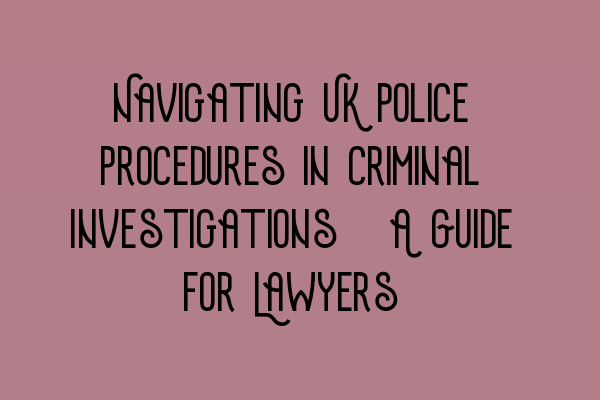Navigating UK Police Procedures in Criminal Investigations: A Guide for Lawyers
Welcome to SQE Criminal Law & Practice Law UK! As solicitors specializing in criminal law, we understand the complexities and challenges that lawyers face when navigating UK police procedures in criminal investigations. In this comprehensive guide, we will provide you with invaluable insights and knowledge to help you effectively represent your clients.
Overview of UK Police Procedures
Understanding UK police procedures is crucial for lawyers involved in criminal cases. As a lawyer, it is essential to be familiar with the investigation process, evidence gathering, and the rights of your clients. Properly navigating these procedures can significantly impact the outcome of a case.
When representing your clients, it is crucial to gather all relevant information about the investigation. This includes obtaining copies of police reports, witness statements, and any other evidence that may be pertinent to the case. Being thorough and painstaking in analyzing the evidence will help you build a strong defense strategy.
Arrest and Detention Procedures
Understanding the arrest and detention procedures is key to protecting your client’s rights. It is essential to understand the circumstances that justify an arrest, reasonable grounds for suspicion, and the time limits for detention. Familiarize yourself with the procedures outlined in the Police and Criminal Evidence Act 1984 (PACE) to ensure that your client’s rights are not violated.
During the initial stages of an investigation, it is crucial to advise your clients of their rights, including the right to remain silent and the right to legal representation. By doing so, you can help prevent self-incrimination and ensure that your clients are treated fairly throughout the process.
Gathering and Presenting Evidence
Evidence plays a critical role in criminal investigations and court proceedings. It is your responsibility as a lawyer to gather and present evidence in support of your client’s case. This may involve interviewing witnesses, examining physical evidence, and scrutinizing police reports.
To effectively gather evidence, it is essential to be familiar with the rules and guidelines surrounding disclosure. The Criminal Procedure Rules require both the prosecution and defense to disclose all relevant evidence to each other. Failure to comply with these rules may lead to the exclusion of evidence or other adverse consequences.
In addition, it is important to utilize expert witnesses where necessary. Expert witnesses can provide specialized knowledge and opinions that can greatly strengthen your client’s defense. Ensure that you engage experts who are credible and experienced in their respective fields.
Legal Proceedings and Courtroom Representation
As the case progresses to legal proceedings and courtroom representation, your role as a lawyer becomes even more critical. It is crucial to thoroughly prepare your case, including crafting persuasive legal arguments, examining witnesses, and cross-examining the prosecution’s evidence.
Developing a strong defense strategy is vital to protecting your client’s interests. This may involve challenging the admissibility of evidence, questioning the credibility of witnesses, or presenting alternative explanations for the alleged criminal activity. It is important to stay up-to-date with relevant case law and legal precedents that may impact your defense strategy.
Continuing Professional Development and Preparation
As the legal landscape evolves, it is critical to engage in continuous professional development to stay updated on changes and developments in criminal law and police procedures. Attending relevant seminars, workshops, and training programs can enhance your knowledge and skills, allowing you to provide the best representation for your clients.
At SQE Criminal Law & Practice Law UK, we offer comprehensive SQE preparation courses for both SQE 1 and SQE 2 exams. These courses are designed to equip aspiring solicitors with the necessary knowledge and skills to navigate the complex world of criminal law. Check out our SQE 1 Practice Exam Questions and SQE 1 Practice Mocks FLK1 FLK2 to familiarize yourself with the exam format and test your knowledge.
For upcoming exam dates and more information on our SQE preparation courses, visit our SQE 1 Preparation Courses and SQE 2 Preparation Courses pages. Stay informed about important events and deadlines by checking our SRA SQE Exam Dates page.
Thank you for choosing SQE Criminal Law & Practice Law UK as your trusted resource for navigating UK police procedures in criminal investigations. We are dedicated to helping lawyers achieve excellence in their practice and provide exceptional representation for their clients. If you have any questions or require further assistance, please do not hesitate to contact us.
